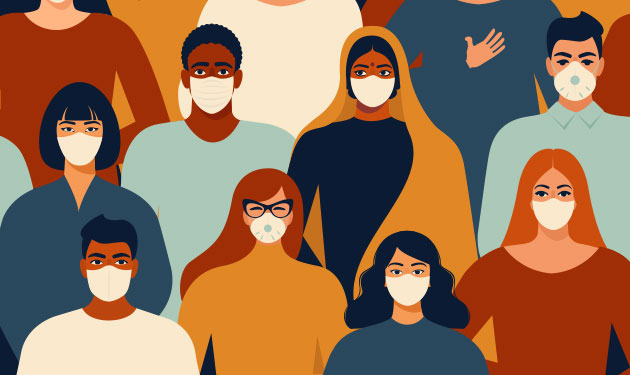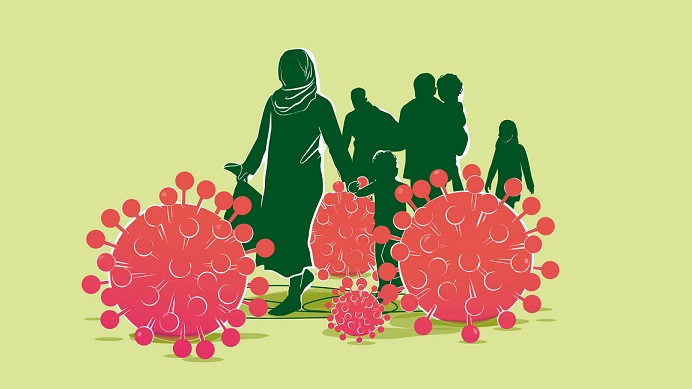When crises begin to flood the world, the stability of countries is disturbed. Each starts helping their citizens to stay safe with the least losses possible and invest all their resources towards the prevention of this disaster and elimination of the risks. Many crises have dominated the world before, such as the avian flu, and now the world is occupied with the nightmare of Coronaviruses. But what do we mean by Coronavirus? It is a large group of viruses that can infect humans and animals alike, causing respiratory diseases. In 2002, SARS, an acute respiratory syndrome, was an example of the Coronavirus which was transmitted from animals to humans. The novel Coronavirus began to spread in China. Its symptoms vary from influenza to pneumonia. The main problem is that it spreads rapidly through the shaking of hands, or by touching contaminated surfaces. The death rate caused by Coronavirus is 5% of total cases worldwide.
Sudan is advantaged with a large land area, great ethnic and class diversity, and the differences in customs and traditions among its regions. The current stage is one of the most difficult upon the new Sudan and the Sudanese, taking into considerations the change happening, and implementation of the revolution demands. The difficulty of this period is embodied in the political and economic instability on the one hand. On the other hand, it also manifests in the struggles faced by the citizens, such as: the high prices of gasoline, bread, basic needs, and transportation among other things. In light of this difficult period that our country and the transitional government are experiencing, how will Sudan confront the spreading of the novel Coronavirus?

Source: goindigo.in
Third-world countries are not like the rest, they lack many of the needed facilities to combat such crises. Sudan is one of these countries and has a large population and ethnic variance, and the transitional government is challenged with the lack of capabilities. Therefore, the Sudanese Ministry of Health began early detection and investigation of suspected cases. A quarantine was also allocated to those infected. The government communicated a number of precautions and strategies to reduce the prevalence of the Coronavirus among citizens and limit the spreading, including: suspending flights and traveling among states, and the suspension of studies for all the educational institutions.
The transitional government imposed a curfew from six o'clock in the evening to 6 in the morning. I do not understand the point of this curfew, especially that the Sudanese normally limit their movement in the evening. There are some who are owners of evening business. How can you announce a curfew at this time while the daytime is crowded by people in markets, bakeries and gas stations? All of this can increase the spread of Coronavirus in the morning and afternoon time. The curfew must be comprehensive. It should be planned in a way that protects the citizen from the risk of infection with this virus. That’s why movements should be permanently prohibited. Nevertheless, there are obstacles that stand in the way of applying such a decision: the day-to-day workers, the bread that is not always available, among many more. Therefore, the transitional government should seek solutions to these problems, keep the citizens safe, and limit the spread of the novel Coronavirus.
Awareness is one of the basic tools to limit the spread of this virus. It plays an important role in educating the masses about the methods of prevention and the necessary precautions when a case is detected. There are challenges that make the awareness in Sudan limited to certain regions. The lack of education in those regions is one of them, as the lives of their inhabitants are overwhelmingly about grazing and cultivation. The inaccessibility of information is another challenge. Many regions lack electricity and Internet, and they would need organizational and government-sponsored awareness campaigns on the Coronavirus and prevention means.
Customs and traditions are the building blocks of identity and lifestyle of Sudanese people, and can be problematic, too. For example, people depend on traditional treatment when they are sick. Telecom operators play an important role in raising awareness, by mass-sending messages that encourage people to stay at home. Social media platforms can contribute as well, by introducing awareness ideas in variant ways that make it easier to be understood by everyone. Citizens have a role in awareness and they can explain and communicate prevention methods among their circles.

Source: kirkonulkomaanapu.fi
Awareness is the only weapon we have to fight against Coronavirus. The world is still suffering. In light of this pain, each and every person holds the responsibility for prevention, especially that governments are impotent in front of the needed scale of intervention. Adhering to the guidelines announced by WHO is important, which are:
1. Washing hands with soap and water, or using an alcohol solution to scrub the hands.
2. Washing hands with soap and water when dirt gets to them.
3. Not touching the face and eyes.
4. Having warm drinks.
Prevention is any activity that leads to a decreased spread of diseases or death. There are important prevention methods for our country: social-distancing by keeping a distance of one or two meters between one and another to avoid the transmission of the virus from an infected to a healthy person. Sudan is threatened by the rapid spreading of Coronavirus due to daily persistent crowds. Therefore, citizens must take all preventive methods seriously- especially at crowded places- in order to reduce the chances for spread. The situation for the medical staff, detection and treatment equipment, and quarantine areas is not reassuring. Each member of the society is responsible with a role to play. There are also methods of prevention that can limit the spread of the Coronavirus among citizens, especially in crowded places:
1. Sneezing into your elbow instead of hands.
2. Washing hands after sneezing and coughing.
3. Avoiding touching the eyes, nose and mouth before cleaning the hands.
4. Maintaining proper eating habits.
5. Use a face mask.
6. Dealing with this epidemic as a serious matter, and reporting any suspected cases.
Prevention is always the most effective tool, and awareness needs us to learn about the causes of the disease, how infections occur, and ways of spreading. If you care about the wellness of your family, beloved ones, and the country, please stay at home.
